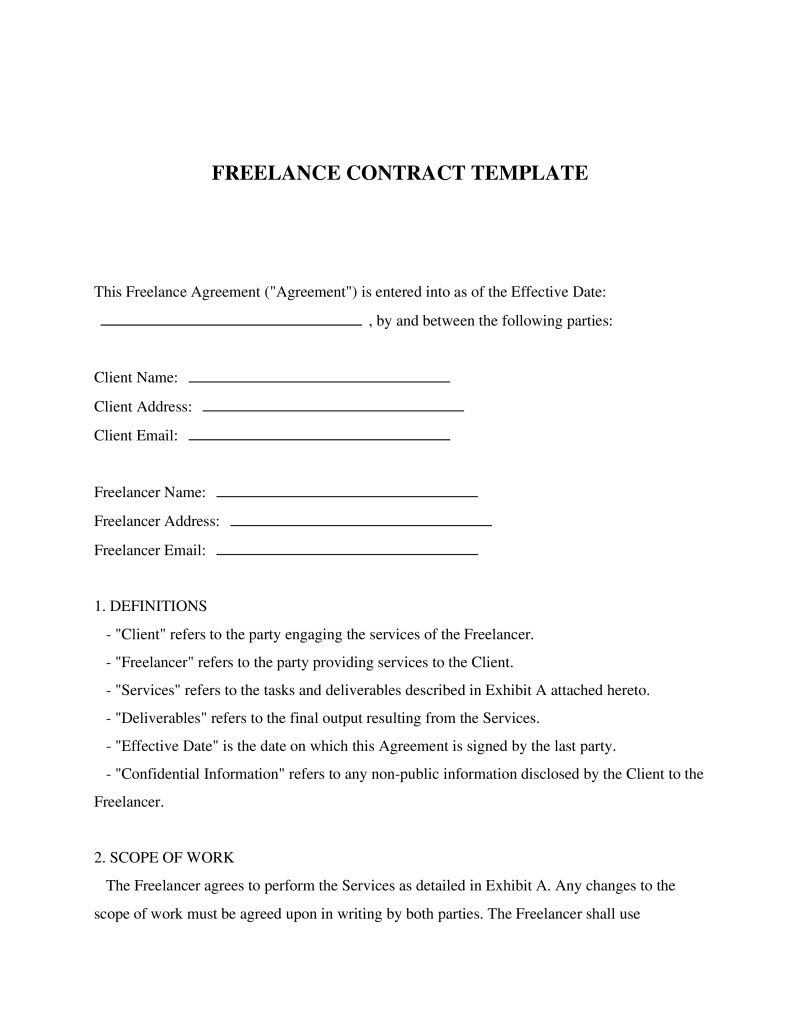A freelance contract is a legal agreement outlining terms between a freelancer and a client, detailing services, payment, and timelines.
Client Name
Type the full legal name of the Client as it appears on official documents, such as a driver's license or passport. Make sure to include any middle names and correct spellings, as this information is important for contracts and legal agreements. Using the correct legal name helps avoid issues in the future regarding identification and responsibilities.

Table of Contents
What is a Freelance Contract?
A Freelance Contract serves as a legal agreement between a freelancer or independent contractor and their client, detailing the services to be provided, terms of compensation, deadlines, and other essential aspects of the work relationship. This document is crucial for both parties to ensure clarity, prevent misunderstandings, and protect their interests. It is particularly beneficial for freelancers who seek to establish clear expectations with their clients and ensure payment for their services. Similarly, clients benefit from having a structured agreement that delineates the scope of work and delivery timelines, thereby safeguarding their investment in freelance talent.
Key Features
Important Provisions
- Description of Services: A comprehensive outline of the services to be provided by the freelancer.
- Compensation and Payment Terms: Detailed information on rates, invoicing schedule, and payment methods.
- Intellectual Property Rights: Clauses defining ownership of work product created during the engagement.
- Confidentiality: Provisions ensuring both parties maintain confidentiality of proprietary information.
- Termination: Conditions under which the contract may be terminated before completion of services.
Pros and Cons
Pros
- +Reduces potential disputes by clearly stating work expectations and payment terms.
- +Enhances professional credibility of the freelancer in front of clients.
- +Provides a legal framework that protects both the freelancer's and client's rights.
- +Enables smooth project management by outlining key milestones and deliverables.
- +Facilitates easier resolution of conflicts through predefined dispute resolution mechanisms.
Cons
- -May require legal consultation to fully understand or customize complex clauses.
- -Could potentially limit flexibility for freelancers who prefer less structured engagements.
- -Standard templates may not cover all unique aspects of every freelance project.
Common Uses
- For independent contractors providing specialized services like graphic design, writing, or programming.
- When engaging in long-term projects requiring ongoing freelance support.
- In situations where confidentiality and intellectual property rights are critical concerns.
- For one-off projects needing clear deliverables within specified timelines.
- By freelancers who wish to formalize verbal agreements into binding contracts.
- To establish recurring consulting or advisory services on a freelance basis.
Frequently Asked Questions
Do you have a question about a Freelance Contract?
Example questions:
Not the form you're looking for?
Try our legal document generator to create a custom document
Community Discussion
Share your experience and help others
Legal Notice: Comments are personal opinions and do not constitute legal advice. Always consult a qualified attorney for matters specific to your situation.
Comments (0)
Leave a Comment
No comments yet. Be the first to comment!